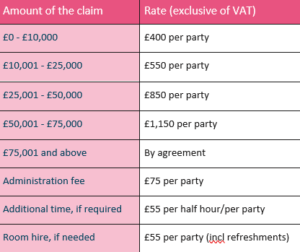Guide
Reasons to mediate
Mediation is an effective way of resolving disputes and has many advantages over litigation. It can be quicker, less stressful and cheaper than going to court and has a high success rate with around 80 per cent settling on the day or shortly afterwards.
What is mediation?
Mediation is a process that can be used to settle a wide spectrum of disputes, such as those arising out of commercial contracts, landlord and tenant relationships, property ownership, boundaries and rights of way.
It is a voluntary, private and confidential meeting of the parties, where, with the assistance of a mediator acting as a facilitator and an impartial third party, the parties can attempt to reach a settlement that is acceptable to all those involved.
If the parties do reach a settlement, the agreement will be binding. If they are unable to reach a settlement or agreement the matter can still carry on to court, where the details of the mediation will not be disclosed.
One important point is that mediation does not rely on normal court remedies. This is its great strength as there may be solutions which would otherwise not be available to the court, but which suit the situation, and which may help the parties to reach a settlement.
How does it work?
A mediation normally take places over one day and it tends to involve both parties meeting with an independent mediator who will try to facilitate a settlement agreeable to both. The aim is to allow the parties to reach a mutually acceptable compromise.
The mediator’s role is to act as a go-between, to help the parties to reach their own conclusion. If an agreement is reached it will be set out in writing and signed by the parties. This agreement will then be enforceable by the courts without the need to go to a full hearing.
What are its advantages?
- It is flexible: arrangements can be made to discuss things which might be outside the scope of any formal dispute
- It is private and confidential: what is said at mediation stays at mediation
- It can help retain relationships: may help businesses preserve commercial relationships with those with whom they are in dispute, as it needs a collaborative approach to reach a result
- It is quick: mediation is arranged to suit the parties and can often be set up in a matter of days
- It works: around 80 per cent of mediations settle on the day or shortly afterwards, making it an attractive and highly effective way to resolve a dispute.
What disputes are suitable for mediation?
- Commercial disputes
- Environmental disputes
- Contested wills
- Property disputes
- Construction disputes
- Landlord and tenant disputes
- Personal injury disputes
- Probate disputes
- Professional negligence disputes
- Supplier-client disputes
- Neighbour disputes.
When should it be considered instead of litigation?
- If the cost of litigation is expected to be disproportionate to the value of the claim
- If negotiations are deadlocked
- If there are multiple actions involving common parties
- If the issues are highly complex and involve multiple parties
- If the issues involved are sensitive or require the disclosure of sensitive information
- If the parties want to avoid publicity.
How can we help?
We provide mediation services to businesses and individuals in a variety of areas. Our accredited mediators are trained to deal with complex issues and will apply the principles learned from their experience both as mediators and lawyers.
We can help with civil or commercial disputes of any size and merely require a simple agreement between the participants to allow us to mediate.
Our Regency offices in central Cheltenham can be hired to host a mediation.
What does it cost?
The cost of mediation depends on the complexity of the issues involved and the length of time required which will be established and fixed at the outset. The parties share the cost equally and they do not have to appoint legal representatives.
As a guide the charges that would normally apply are set out below. Claims up to £10,000 are a small claim and we would normally arrange a 3-hour mediation for this. Any longer mediations will be conducted for an agreed fee on a case by case basis.

What is the next step?
If you would like to find out whether mediation is an appropriate means of attempting to settle a dispute, or you would like more information about this service, please contact any of our mediators.
Disclaimer: Please note that this fact sheet is for guidance only and is not intended to replace legal advice.









